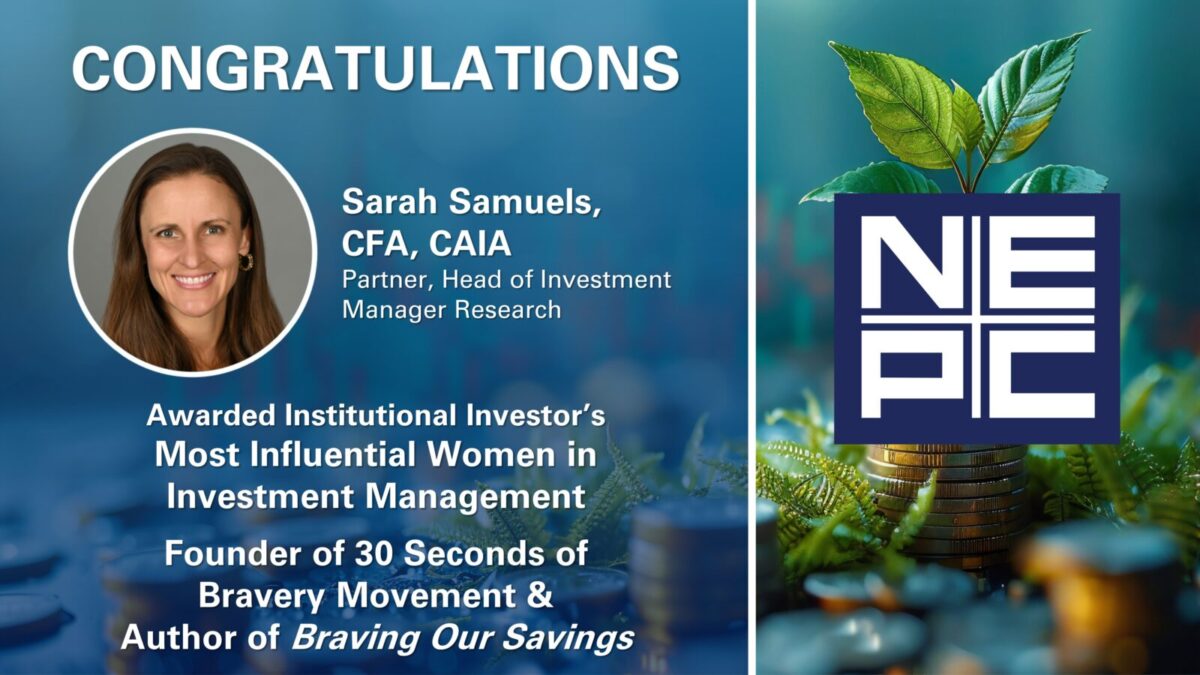Institutional Investor: Sarah Samuels Named to 2024 Most Influential Women in Investment Management Category
NEPC’s Head of Investment Manager Research & Partner, Sarah Samuels, has been named to Institutional Investor’s 2024 Most Influential Women in Investment Management category. View excerpts from her interview below or the full interview on the Institutional Investor site here.
Sarah has traversed the industry, alternating between asset management, investing as an asset owner, and her current role in consulting. After she earned her bachelor’s degree in German and Business from the University of New Hampshire, she spent six years at Wellington Management Company and one year at Boston Advisors.
. . .
II: What is the biggest challenge facing the industry today?
Sarah: The biggest challenge facing the industry is the required shift in mental models to adapt to an environment where cash and fixed income are viable options to invest in the face of inflation. These are things that anyone under 38 has not had to develop a skill set for. There’s a whole swathe of investors who need to re-map how their brains work to build portfolios, and it may change some long-standing assumptions.
The other is, do the map: Model out what the deals are today.
. . .
II: What is the most exciting part of the job that gets you up in the morning?
Sarah: It’s early-stage investing, as well as lending with the right GP partners, so being a lender with smart underwriting: There’s a lot of interesting things, and valuations are very interesting.
I didn’t know this industry existed. I started out as an admin at Wellington. I thought I’d be a lifer as an admin until I saw a woman who was an admin like me. Jean Hines was very commanding and picked healthcare stocks. I watched how she carried herself and the credentials that she got.
I had some other mentors: One was Michael Even, MassPRIM Board Investment Committee member, and the other was Erinn King then Vice President at Wellington Management Company, currently Chief Strategy Officer at Income Research + Management.
. . .
II: If you were not an allocator, what would you be doing today?
Sarah: I would be teaching people how to ski out in the west or in Europe.
. . .
II: If you could change one thing about the industry, what would it be?
Sarah: I wish that people could stay focused on to the capital that we oversee and the responsibilities that we have as stewards of capital and that what makes the world go round, remembering the members whose capital we are managing.
Click here to read the full interview on the Institutional Investor site.
Crain Currency: Family Offices Face Growing Due Diligence Demands in Direct Investing
NEPC’s Dan Gimbel has been featured in an article from Crain Currency for his insights on family investing, view excerpts below or read the full article on the Crain Currency site here.
Direct investing can provide family offices greater control over their investments and higher rates of return than private equity or venture capital funds. But the proper due diligence to make the right direct investments can be a challenging resource commitment for many family offices.
. . .
“What’s become a little more common is families that are investing more like a syndicate, where they’ll put a consortium of six, eight or 10 families together,” said Dan Gimbel, a principal at NEPC private wealth. “Oftentimes those families will have varying backgrounds in different industries where they created their wealth. They may source a business in real estate, another in manufacturing and another one in oil and gas.”
Click here to read the full article on the Crain Currency site.
Chief Investment Officer: Rick Ciccione Named to 2024 Knowledge Brokers List
NEPC’s Rick Ciccione has been named to Chief Investment Officer’s 2024 Knowledge Brokers list, view excerpts from his interview below or the full interview on the CIO site here.
Richard K. Ciccione joined NEPC in 2017 as a senior consultant and has 19 years of experience in institutional investment consulting and financial services. He is a senior member of our endowment and foundation consulting practice and serves on the impact investing committee and the discovery platform committee. In 2022, Rick relocated from Chicago to Colorado to spearhead NEPC’s presence and growth in the Mountain West and Southwest.
. . .
CIO: What changes are you making to your asset allocation advice, given the current state of monetary policy, geopolitics and the impact of inflation and rising interest rates?
Ciccione: Our endowment and foundation clients construct strategic asset allocations that are revisited annually but changed infrequently. However, the latitude they include in their investment policy statement allows them to tactically take advantage of some near-term opportunities. A few recent tactical changes that many clients have made include introducing (or maintaining) a dedicated allocation to large-cap value stocks, shifting safe-haven fixed income from Treasurys to TIPS, and cementing some gains by rebalancing public equities back toward MSCI ACWI weights. With the tremendous run of the Magnificent 7 stocks, large cap growth has performed exceptionally well and skewed the S&P 500 from a core position to a growth-biased holding. Therefore, to reduce the style bias in a portfolio, we are advising clients to take about a quarter of their S&P 500 exposure and invest in large-cap value. TIPS also present an opportunity to generate modest outperformance versus Treasurys going forward, with elevated inflation in a higher for longer environment. Finally, going back to a lesson learned in Investing 101: sell high, buy low. Based on this simple premise, we’re advising clients to rebalance public equities back toward MSCI ACWI weights after strong performance from U.S. equities.
. . .
CIO: What actionable thing have you learned over the course of your career that has proven itself this year?
Ciccione: While my path to investment consulting hasn’t been a linear one, the primary lesson I learned early in life, which has been reinforced repeatedly during my career, is act with humility and treat people with respect. My parents instilled that in me at a very young age, and it was easy to follow the example they were living daily. I was working at Lehman Brothers as the ship hit the iceberg, and my severance was tied up in bankruptcy court. To make ends meet, I humbly filed for unemployment, cleaned up construction sites and plowed snow overnight.
As it translates to investment consulting, we need to have the humility to acknowledge we’ll get asset allocation recommendations wrong periodically, and at times, investment managers with whom we invest will underperform. This year, any diversification away from the S&P 500 (and the Magnificent 7) presented a headwind to performance. However, being transparent with clients and presenting the rationale for decisions we make helps to garner trust. The only thing we can control, at the end of the day, is how we service our clients. If we aren’t servicing them well, then they have every right to look for someone who will.
. . .
CIO: What asset classes (specific securities or sectors) look good to you now? Why?
Ciccione: We are constructive on lower middle market value buyout strategies in this market environment. Many buyout strategies were able to generate attractive returns through financial engineering during a low-interest-rate environment. With the current elevated rate environment likely to persist for a while, based on Fed Chairman Jerome Powell’s most recent communications, the days of being able to financially engineer attractive returns are behind us. Therefore, we believe lower middle market buyout firms that are focused on low-entry multiples and act as operators give investors the best chance to generate the attractive performance that is needed to generate the total returns our endowment and foundation clients desire.
Additionally, I believe emerging markets equities are poised for a more attractive decade going forward than the sector has experienced recently. My thinking is threefold; First, valuations in emerging markets are attractive on an absolute basis, as well as relative to developed markets equity valuations. Second, the U.S. dollar is trading near historic highs versus many emerging market currencies, so any return to more normalized valuations will serve as a tailwind. Finally, almost everyone else is bearish on emerging market equities, which makes it a perfect time to buy, right?
Click here to read the full interview on the Chief Investment Officer site.
PlanAdviser: DCIO State of the Industry
NEPC’s Bill Ryan was featured in a new PlanAdviser article for his commentary on current trends and the state of the DCIO industry. View excerpts below or the full article on the PlanAdviser site here.
Assets in defined contribution plans keep growing, but so does the scramble for relevant investment solutions as plan sponsors remain focused on low fees.
. . .
Bill Ryan, a partner in and the defined contribution team leader at NEPC LLC, agrees that the firm is continuing to see “heavy cash flow” into target-date funds for all ages—including those older than 65 who are keeping their investments in-plan for longer.
“We’re going to continue to see target-date funds take market share away from the core lineup in the next 12 to 18 months,” Ryan says.
The makeup of TDFs is not sitting still, he notes. Some providers are creating more aggressive glide paths for investors younger than 65 so they do not fear losing out on growth.
. . .
Meanwhile, NEPC’s Ryan says, his team has been interested to see some of the largest passive fund managers coming to market with competitively priced active funds. He believes these offerings will pull money away from the traditional active managers to those large passive fund managers to the tune of some $8 billion in the next 18 months. While that may be small compared to the $3 trillion in actively managed funds, it could seriously shift the market for active funds over the long term.
“I think with the passive providers being able to offer more moderate to aggressive off-the-shelf products, that puts a lot of pressure on the active managers in the space, as, historically, they were the only ones out there [with such offerings],” he says. “If you like a higher-risk posture but at a low-cost entry point, you now have a choice.”
The challenge for active managers working with large caps, Ryan notes, is the dominance of the Magnificent 7 tech stocks of late, because active managers may have restrictions on what percent of investments can be held in a single or group of stocks. Even if that is only causing relatively short-term underperformance, it could trigger plan fiduciary monitoring for the funds to be reviewed or replaced.
. . .
But Ryan of NEPC notes that recent 401(k) litigation has resulted in “unfortunate press” that may crimp managed account uptake. Ryan notes recent complaints responding to managed account use by providers TIAA and Morningstar and engineering and construction company plan sponsor Brechtel.
The strain has been taking its toll on clients, he says, with a handful of NEPC clients “voting to terminate managed accounts” from their plans, representing “in the neighborhood of $3 billion.”
Ryan, whose NEPC has, in the past, been critical of the fees charged for managed accounts, says there will likely be further pullback from offering the personalized savings vehicles to investors, in part because of further litigation that may drop.
. . .
Finally, Ryan of NEPC notes that in the next six to 18 months, “we are going to be in a very different interest rate environment,” with the Federal Reserve likely to move rates lower.
NEPC predicts that new market environment will bring back interest in stable value funds, which had been displaced by safer investments, such as money market funds, that could guarantee strong returns on the back of high interest rates. As rates fall, stable value “is going to pop,” Ryan forecasts.
“Stable value has a structural advantage and likely has weathered the storm of higher interest rates,” he says.
Click here to continue reading the full PlanAdviser article.
Pensions & Investments: Large-Cap Active Growth Equity Funds Led Corporate 401(k) Plan Investment Changes in 2023
NEPC’s Bill Ryan was recently featured in an article by Pensions & Investments for his insights on manager turnover in large cap growth funds. View excerpts below or the full article on the Pensions and Investments site here.
Well over 100 U.S. corporate 401(k) plans made changes to their investment option lineups in 2023. That’s nearly double the number that disclosed changes the previous year, with 401(k) plans in 2023 saying changes to active domestic large-cap growth equity options dominated
. . .
There has also been turnover among portfolio managers of active large-cap growth funds, with a number of them choosing to retire following the COVID pandemic, said Bill Ryan, partner and head of defined contribution solutions at investment consultant NEPC. Those departures just happened to occur while there was this large dispersion in returns.
“(This) creates triggers in investment policy statements,” said Ryan, “so if you have key staff changes and performance challenges, you hit two things that people look at. So while the performance in isolation might not have triggered a change, the portfolio manager changed and the performance is down.”
Click here to continue reading the full Pensions & Investments article.
PlanSponsor: Managed Accounts Provide Opportunity, Challenges as a Retirement Income Solution
NEPC has been featured in an article by PlanSponsor for our outlook on managed accounts. View excerpts below or the full article on PlanSponsor’s site here.
Managed accounts have been around for more than 20 years as a defined contribution plan option, but the tailored investment vehicles have evolved considerably over the years, allowing plan sponsors to consider them as a tool to offer a retirement income solution to their participants.
. . .
Some firms have been more critical of managed accounts, largely because of the fees that are often attached to the personalized service. For example, NEPC argued in a report published in June that after including the fee charged by the managed account provider, savings advice has a “negative return on investment after the first year.”
NEPC argued that this is mainly because managed account fees are charged based on participants’ total assets rather than on changes to their annual savings.
“We believe savings advice should be a one-time charge commensurate with the incremental change in participant’s savings rate, rather than a recurring expense,” NEPC stated in its report.
Click here to continue reading the full PlanSponsor article.
Bloomberg Radio: US Consumer Confidence Rises
NEPC’s Sarah Samuels was featured on the Bloomberg Intelligence Podcast for her commentary on what bigger institutional investors are doing with current trends. Listen to the podcast on Bloomberg here.
Pensions & Investments: Outsourced CIO assets from pension funds slipped over the past year. Here's why managers aren't concerned.
NEPC’s Scott Perry was recently featured the Pensions & Investments OCIO Special Report for his take on the current state of pension funds. View the article on the Pensions & Investments site here.
Institutional demand for outsourced CIO services motored ahead in 2023, even as the baton in the race to drive industry growth showed signs of passing from defined benefit pools to endowments, foundations and defined contribution plans.
. . .
NEPC’s 73% gain in worldwide institutional outsourced AUM to $106.6 billion for the year through March 31 was powered by a combination of new DB and DC clients, said Scott Perry, a partner and head of portfolio strategy with the Boston-based consult and investment house.
“We had a number of large defined contribution programs that engaged us for OCIO mandates … and then there were a lot of advisory clients that we had relationships with that asked us to play a bigger role in their investment programs,” he noted.
Click here to continue reading the full Pensions & Investments article.
Pensions & Investments: IBM's move sparks hope for defined benefit bounce back
NEPC’s own Scott Perry was recently featured in a portion of Pensions & Investments OCIO Special Report, this time featuring his commentary on IBM. View the article on the Pensions & Investments site here.
Outsourced CIOs reporting a growing number of pension risk transfers by defined benefit clients they’ve guided to full funding could be forgiven for looking at the DB portion of their businesses as a wasting asset.
. . .
IBM’s example has “caught the eye of other pension plan decision-makers,” agreed Scott Perry, a partner and head of portfolio strategy with Boston-based consultant and investment house NEPC, leaving some considering a different way forward now that could shift the balance between DC and DB “a bit.”
. . .
That desire to attract and retain employees — effectively the “original intent” of offering pension plans in the first place — is once again boosting corporate plan sponsor interest in retaining their pension plans, agreed NEPC’s Perry.
Click here to continue reading the full Pensions & Investments article.
Pensions & Investments: Could OCIO Reporting Standards Bring Light to Opaque Universe?
NEPC’s Head of Portfolio Strategy, Scott Perry, was recently featured the Pensions & Investments OCIO Special Report for his insights on OCIO reporting standards. View the article on the Pensions & Investments site here.
Efforts underway now to come up with outsourced CIO reporting standards could be one means of making what remains a crowded, opaque market segment easier for institutional clients to navigate.
Or not, depending on whom you ask.
. . .
Scott Perry, a partner with Boston-based NEPC, counts himself among the optimists, holding out hope that an ongoing CFA Institute exercise charged with creating rules of the road for OCIO reporting could lay the groundwork for more consistent reporting of OCIO track records and performance over the coming six to 12 months.
He said coming guidelines — “an important next step for the rapidly expanding OCIO solutions market” — should help stakeholders make more informed decisions about the options available to them.
“Historically, it has been hard for stakeholders to do an apples-to-apples comparison of OCIO track records,” Perry noted.
The coming guidelines, while not perfect, will move in the direction of making such comparisons possible – considerable progress for a market segment that retains “a little bit of the Wild West” about it, he said.
. . .
“It’s highly competitive, with a lot of players and still limited consolidation,” noted NEPC’s Perry. Meanwhile, there are three major categories of OCIOs — those linked to asset managers, investment consulting firms and endowment boutiques, he said.
Click here to continue reading the full Pensions & Investments article.









